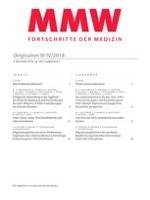Erschienen in:

26.10.2018 | Migräne
Migräneprophylaxe mit einem Probiotikum
Ergebnisse einer unkontrollierten Anwendungsbeobachtung mit 1.020 Teilnehmern
verfasst von:
Univ. Prof. Dr. med. Andreas Straube, Dr. med. Hilke Müller, Dr. scient. med. Verena Stiegelbauer, Mag. Anita Frauwallner
Erschienen in:
MMW - Fortschritte der Medizin
|
Sonderheft 5/2018
Einloggen, um Zugang zu erhalten
Zusammenfassung
Hintergrund
Patienten mit Migräne leiden häufig auch unter Magen-Darm-Störungen wie Reizdarmsyndrom, chronisch entzündlicher Darmerkrankung oder Zöliakie. All diesen Erkrankungen ist eine erhöhte Darmpermeabilität („leaky gut“) und dadurch vermehrte Entzündungsaktivität gemeinsam. Es kommt zu einem Anstieg proinflammatorischer Zytokine im Serum, wodurch wiederum Migräneattacken getriggert werden können. Probiotika können positiv auf das Darmepithel einwirken und die entzündliche Aktivität reduzieren. Eine erste unkontrollierte, kleinere Studie mit 39 Migränepatienten konnte einen Rückgang der Attackenfrequenz unter der täglichen Einnahme eines Probiotikums zeigen.
Methode
In einer unkontrollierten Anwendungsbeobachtung wurde der Einfluss eines speziell formulierten Multispezies-Probiotikums auf die Häufigkeit von Migräneattacken und die Intensität migräneassoziierter Beschwerden erfasst. Ausgewertet wurde die Selbstauskunft von 1.020 Patienten.
Ergebnisse
Über den Behandlungszeitraum von 8 Wochen wurde die Anzahl der Kopfschmerztage von 2 auf 1,4 Tage pro Woche reduziert. Die Kopfschmerzintensität nahm von 5,1 auf 2,1 Punkte (0 = nicht vorhanden bis 6 = sehr intensiv) ab. Die migräneassoziierten Beschwerden wurden verringert, der Schmerzmittelkonsum halbierte sich. Alle Ergebnisse waren statistisch signifikant (p ≤ 0,001).
Schlussfolgerung
Ein positiver Effekt des verwendeten Probiotikums auf Migränepatienten und deren Beschwerden kann angenommen werden, jedoch sind zur weiteren Bestätigung randomisierte, placebokontrollierte Studien notwendig.